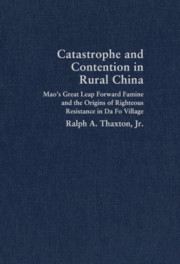 Catastrophe and Contention in Rural China
Catastrophe and Contention in Rural China Book contents
- Frontmatter
- Contents
- Acknowledgments
- Cast of Characters: Da Fo Village (Great Buddha), 1920–1993
- Chronology of Important Events
- Map 1 Provinces of China, neighboring countries, and area of study
- Map 2 Hebei-Shandong-Henan border area, showing location of Da Fo village
- INTRODUCTION
- 1 THE REPUBLICAN ERA AND THE EMERGENCE OF COMMUNIST LEADERSHIP DURING THE ANTI-JAPANESE WAR OF RESISTANCE
- 2 THE ASCENT OF THE VIGILANTE MILITIA: THE VIOLENT ANTECEDENTS OF MAO'S WAR COMMUNISM
- 3 THE ONSET OF COLLECTIVIZATION AND POPULAR DISSATISFACTION WITH MAO'S “YELLOW BOMB” ROAD
- 4 THE MANDATE ABANDONED: THE DISASTER OF THE GREAT LEAP FORWARD
- 5 STRATEGIES OF SURVIVAL AND THEIR ELIMINATION IN THE GREAT LEAP FORWARD
- 6 THE ESCAPE FROM FAMINE AND DEATH
- 7 INDIGNATION AND FRUSTRATED RETALIATION: THE POLITICS OF DISENGAGEMENT
- 8 THE MARKET COMES FIRST: THE ECONOMICS OF DISENGAGEMENT AND THE ORIGINS OF REFORM
- 9 PERSISTENT MEMORIES AND LONG-DELAYED RETALIATION IN THE REFORM ERA
- CONCLUSION
- Bibliography
- Index
- Plate section
9 - PERSISTENT MEMORIES AND LONG-DELAYED RETALIATION IN THE REFORM ERA
Published online by Cambridge University Press: 14 May 2010
- Frontmatter
- Contents
- Acknowledgments
- Cast of Characters: Da Fo Village (Great Buddha), 1920–1993
- Chronology of Important Events
- Map 1 Provinces of China, neighboring countries, and area of study
- Map 2 Hebei-Shandong-Henan border area, showing location of Da Fo village
- INTRODUCTION
- 1 THE REPUBLICAN ERA AND THE EMERGENCE OF COMMUNIST LEADERSHIP DURING THE ANTI-JAPANESE WAR OF RESISTANCE
- 2 THE ASCENT OF THE VIGILANTE MILITIA: THE VIOLENT ANTECEDENTS OF MAO'S WAR COMMUNISM
- 3 THE ONSET OF COLLECTIVIZATION AND POPULAR DISSATISFACTION WITH MAO'S “YELLOW BOMB” ROAD
- 4 THE MANDATE ABANDONED: THE DISASTER OF THE GREAT LEAP FORWARD
- 5 STRATEGIES OF SURVIVAL AND THEIR ELIMINATION IN THE GREAT LEAP FORWARD
- 6 THE ESCAPE FROM FAMINE AND DEATH
- 7 INDIGNATION AND FRUSTRATED RETALIATION: THE POLITICS OF DISENGAGEMENT
- 8 THE MARKET COMES FIRST: THE ECONOMICS OF DISENGAGEMENT AND THE ORIGINS OF REFORM
- 9 PERSISTENT MEMORIES AND LONG-DELAYED RETALIATION IN THE REFORM ERA
- CONCLUSION
- Bibliography
- Index
- Plate section
Summary
The return of Bao Zhilong to the post of party secretary in 1973 marked the end of the Cultural Revolution in Da Fo village. Villagers waited to see if Bao would attempt to atone for his Great Leap Forward sins or retaliate against his tormentors. Like Deng Xiaoping, who became the leader of the party-state following Mao's death in 1976, Bao Zhilong had been hurt by the Cultural Revolution. Both men faced a serious political dilemma: the Great Leap Forward and its attendant famine had all but destroyed their party's claim to legitimacy, the claim that had equated socialist rule with the recovery of the decent standard of living that had been threatened under the Kuomintang and with the end to the violent disorder that had prevailed during the Japanese invasion. Somehow, the Communist Party had to quickly restore its reputation for revolutionary virtue. The key to this process, from the perspective of the party propagandists in Beijing, was to take charge of the discourse on the Great Leap fiasco in order to remake the popular memory of this catastrophe. The party leadership sought to reassert its authority and rescue its legitimacy by a practice known as yiku sitian (remembering the bitter past and savoring the sweet present), that is, a moralistic discourse that framed history to serve its own political ends.
Familiar with the ritualized pressures of yiku sitian, villagers had typically surrendered to this movement.
- Type
- Chapter
- Information
- Catastrophe and Contention in Rural ChinaMao's Great Leap Forward Famine and the Origins of Righteous Resistance in Da Fo Village, pp. 292 - 324Publisher: Cambridge University PressPrint publication year: 2008


